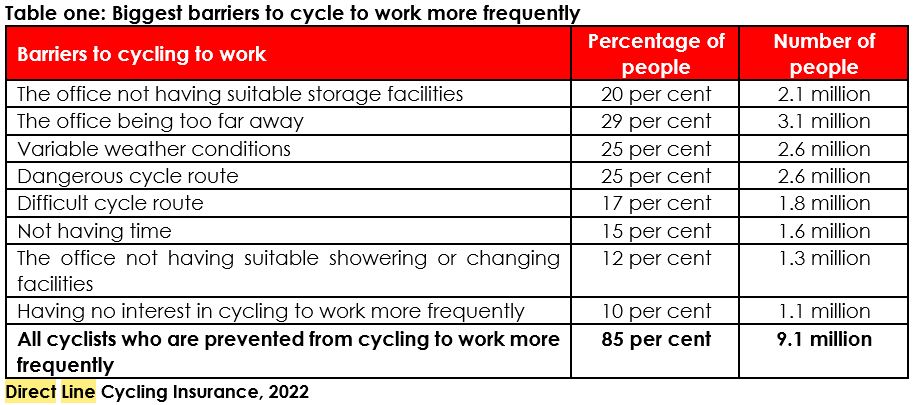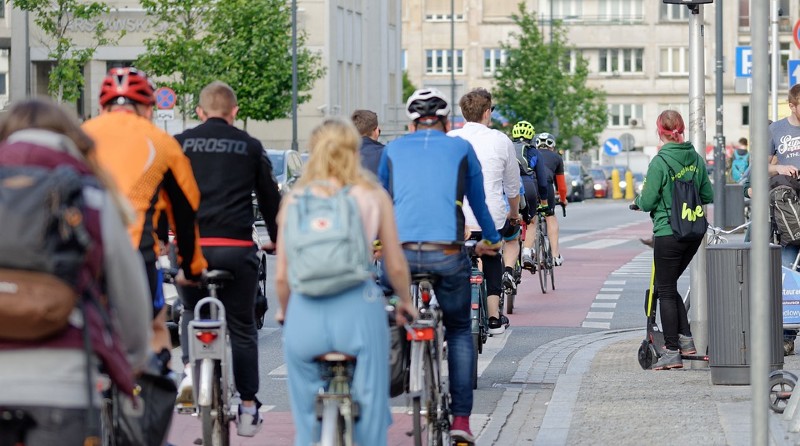1.5 million cycle commuters put off by lack of secure workplace storage
New research suggests that as many as 1.5 million cycle commuters are deterred by the lack of bike storage facilities at their workplace.
The research, carried out by Direct Line Cycling Insurance, reveals that commuters are being increasingly discouraged from cycling into work by a number of factors, with those who do ride to work often facing a dilemma regarding where to store their bike. The problem is indeed pronounced enough for business models to appear solely focused on alleviating the concern.
With the research finding that those who cycle to work every day typically spend around £873 on their bike, this points to an estimated £1 billion worth of bikes being used to commute every day across the UK. Direct Line suggests that irregular cyclists spend around £420, so less than half the upper figure cited by its audience. CI.N house research has average sales prices for pedal powered bikes (not specifically commuter bikes) sat at around £750 when sold via independent bike shops. (Our report is available to purchase by emailing the editor).
This does raise the question, “How much is the cycling industry worth?” relative to other UK economic sectors.
Given the substantial economic value, coupled with the positive environmental impact, it seems inconceivable that businesses, with ESG targets at front of mind, are failing to support cycle commuting – an activity which is also a pillar of meaningful corporate Health and Wellness initiatives. To this end, the British Council for Offices (BCO) is actively encouraging businesses to put active commuting at the heart of Environmental, Social, and Governance (ESG) policies.
 Vincent Guadagnino, Communications Manager for Direct Line Cycling Insurance said: “There has been a huge rise in the number of commuters choosing to cycle since the pandemic. However, despite the considerable health, cost and environmental benefits, the research suggests that millions of adults are being deterred from cycling in to work.”
Vincent Guadagnino, Communications Manager for Direct Line Cycling Insurance said: “There has been a huge rise in the number of commuters choosing to cycle since the pandemic. However, despite the considerable health, cost and environmental benefits, the research suggests that millions of adults are being deterred from cycling in to work.”
It’s into this gap that Active Transport England steps – looking to build relationships, provided guidance and lobby for development of new facilities; a rounded approach aimed at transforming culture (in public and private sectors) as well as infrastructure, enabling a shift to active transport choices across transport modes. The newly established body received £200 million of its funding, shared with the National Cycle Network (NCN) in May, enabling the body to fund 134 schemes, creating safe infrastructure networks in cities to stimulate cycling and walking.
Such schemes are increasingly looking to include safe public storage space for bicycles and other micromobility transport options, something which Direct Line’s Vincent Guadagnino rightly highlights as critical to encouraging and enabling a great uptake in cycling as transport, for commuters and casual cyclists switching from cars to bikes for simple daily journeys which don’t terminate at a workplace.
Insurance plays a critical role here.
Attitudes toward bike theft also need to shift.
Currently bike theft is – when viewed through the response owners of stolen bikes receive when interacting with the Police – seen as low priority. Cases are very often dropped inside 24 hours in London. This is likely a reflection of how policing performance is measured by government, with time and resource directed to metrics linking overall Force performance with both senior management appraisals and funding for each individual Force.
With increases in cycling as transport driven largely by eBike sales, this approach to bike theft will need to change. £4,000 plus eBikes relied upon to replace a car represent a significant financial investment and a critical means of getting to work. Policing priorities need to shift to reflect this change in status and value for the now ‘not so humble’ bicycle.
Direct Line Cycling Insurance provides riders with comprehensive cover for bikes – both at and away from home – paying out for theft and accidental or malicious damage.



